Read in the May Maoz Israel Report:
· Eliezer Ben Yehuda: A Roadmap to the Impossible
· How Is this Dictionary Different
· Israelis Read Books!
· Israel Turns Right
EPILOGUE: ELIEZER BEN YEHUDAA ROADMAP TO THE IMPOSSIBLE
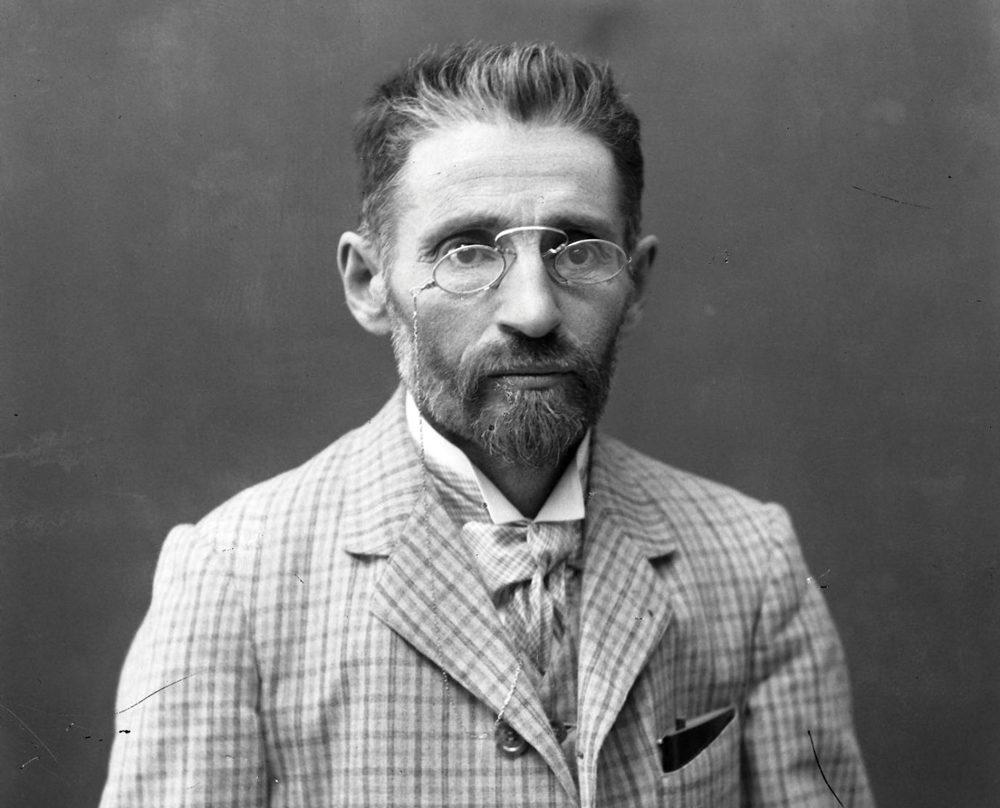
Eliezer Ben Yehuda, Father of the Modern Hebrew Language, believed, when no one else did, that the language of the Bible could be revived to become the language of a new Jewish nation.
With this month of May, Israel’s 70th year of Independence ends. In honor of this prophetic year, I have written about two of the most important people in Israel’s modern history, Theodore Herzl, the Father of Modern Israel, and Eliezer Ben Yehuda, the Father of the Modern Hebrew Language. Most significantly, for the person who is spiritually sensitive, one can see the guiding hand of Providence upon Herzl, and upon Ben Yehuda’s entire family. They all went through unbelievable hardship, but were used by God for His purposes. Therefore, they succeeded in their mission. I wrote two episodes on Herzl and eight episodes (including this Epilogue) on Ben Yehuda. You will find all these episodes in the maozisrael.org archives, beginning with May 2018, or maozisrael.org/herzl-ben-yehuda.
Three years after he moved to Jerusalem, Eliezer Ben Yehuda began work on a “Hebrew dictionary” by listing a few new words in his weekly four-page Hebrew newspaper. The new words came out of necessity when Eliezer and his first wife, Devora, vowed to speak only Hebrew to each other and a few close friends, all of whom barely knew any Hebrew when they immigrated to the region of Palestine in 1881.
Actually, there wasn’t a Hebrew word for “newspaper”—or “printer”—or “post office”—or “stamp”—to mail his newspaper to his few subscribers abroad or in Palestine. There wasn’t a word for “subscriber” or “mail” either.
Yet Ben Yehuda had a mission from which he never wavered—to raise “a spoken Hebrew language” from the dead. To create new words, Eliezer found himself searching the Bible, the Talmud, and all the rabbinical books. But many of the needed words didn’t exist in any of those books, either.
When his first child was born in 1882, Eliezer’s Hebrew world expanded to the need of modern words such as “diaper.” One can imagine why Jews of the late 19th century considered it utterly impossible to resurrect a dead language. It had never happened in the history of mankind. The idea was thought to be pure madness. There was not a single human being on earth who spoke Hebrew as his mother tongue. But Eliezer had a dream and a plan. He would make his firstborn “the grand experiment.”
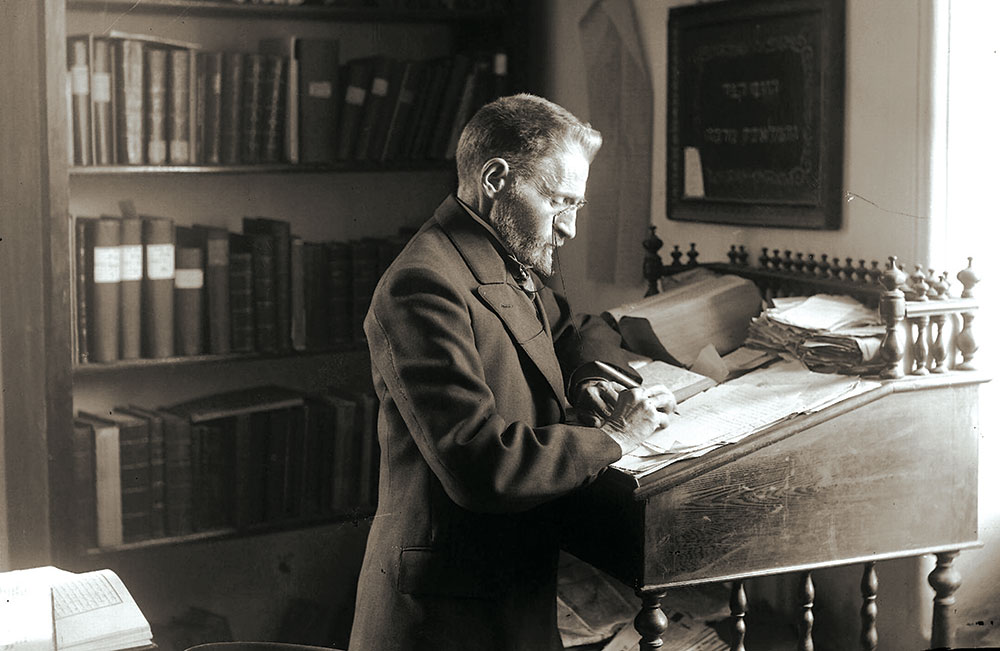
Ben Yehuda, the man who fought tuberculosis in his body for 45 years, preferred to stand while working up to 18 hours a day on his dictionary.
THE GRAND EXPERIMENT
When the news spread that his new son Ben Zion would not be allowed to even hear any other language except Hebrew, the people of Jerusalem actually believed the boy would grow up a disabled “idiot.” Nevertheless, Eliezer and his faithful wife spoke only Hebrew in his presence. This experiment forced them to constantly come up with new words that would meet the needs of families living in the late 19th century lifestyle of the West.
All in all, it is more than doubtful that the Jews returning from the four corners of the world would have agreed on a national language for their newborn state, had the Hebrew language not been prepared for them ahead of time by Ben Yehuda. Indeed, Ben Yehuda and his Hebrew-speaking family became a living legend, an embodiment of a revival that he modeled for others to emulate.
Eliezer realized that if the Hebrew language was to take root among new Jewish immigrants who had begun to settle in and around Jaffa and central Israel, they also needed a vocabulary to express the needs of educated Jews originating from Europe in a world where knowledge was expanding at breakneck speed. Therefore, his best tool at that time was a newspaper.
In 1884, Eliezer founded his own weekly newspaper and started printing a list of a few new Hebrew words in each issue. With Eliezer’s passion and example, little by little, the concept of a modern Hebrew language was beginning to take root among at least a few Jews in Palestine.
But there was another seemingly impossible challenge to overcome. As new immigrants began teaching Hebrew in their schools, the teachers taught according to their taste and accent, even creating their own words. Besides, how do you pronounce a word that didn’t exist until today?
Even before Eliezer moved to Palestine, he was aware there was an Ashkenazi accent spoken by Orthodox Jews from Europe and Russia, and a Sephardic accent of Jews from Arabic nations. (The Yemenite accent was considered the “purest” of all.) Then there were the natural accents of immigrants whose mother tongue was French, German, Yiddish or Arabic.
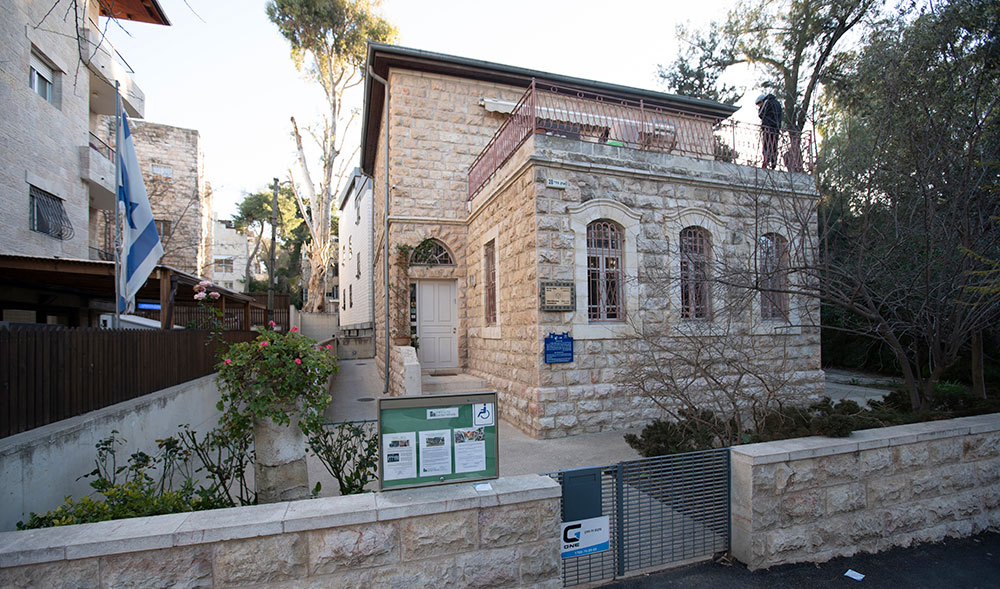
Ben Yehuda Home: He never saw this house, a gift from the American Jewish COmmunity, as it was finished after his death. However, Hemda, his second wife, lived in it for thirty years until her death in 1951. It is now a cultural center and hostel.
A LANGUAGE NEEDS RULES
When Eliezer and Devora spoke with their few friends, they could use the language however they wished. But if Eliezer wanted to circulate a modern tongue with the goal of making it universally spoken among Jews in the Holy Land, the words had to be precise and accurate, according to strict linguistic rules. Therefore, Ben Yehuda became a self-taught scientific lexicographer.
But how was the average reader of his newspaper, who obviously had a very small vocabulary, able to remember all the new words of each week’s newspaper?
And what about the few bold pioneers teaching Hebrew at their makeshift schools in their settlements? They were without a single Hebrew textbook. So, Eliezer began helping them compose such textbooks—not just to learn the language—but to teach math, history and everything else in Hebrew.
Eliezer became increasingly aware of the greatest need of all: “Our crying need is for an up-to-date dictionary. Here we are trying to teach people to speak a language and there is no dictionary of that language!” In fact, there wasn’t even a word for dictionary!
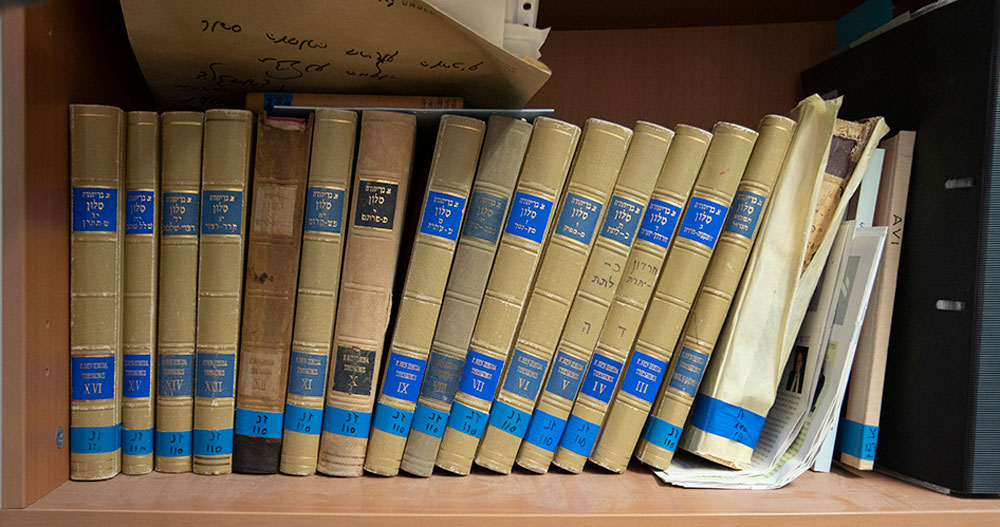
A set of Eliezer Ben Yehuda’s The Complete Dictionary of Ancient and Modern Hebrew stored in the Academy of the Hebrew Language headquarters in Jerusalem. One of the 17 volumes is missing.
DID ANYONE SPEAK HEBREW?
It is true that in some parts of the world there were Jews who had to conduct business with other Jews who had no common language with each other except their Hebrew prayers. They created a kind of pidgin, a semi-language that included words, sounds, body language, simplified syntax, and limited vocabulary. It, of course, was never learned as a first language. But this limited speech encouraged the young Ben Yehuda even before he went to Palestine to believe that Hebrew could again be spoken.
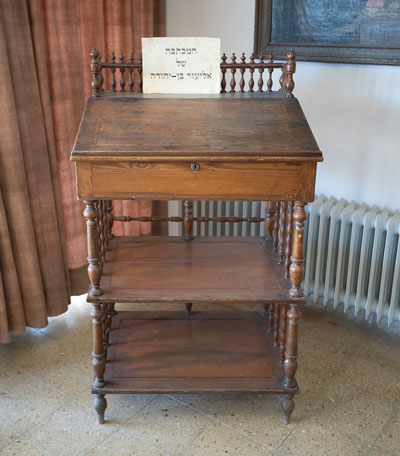
Ben Yehuda’s original desk, made for him to stand while working.
It is estimated that about 50% of male Jews of the 19th century could read the Torah and rabbinical books. But here was the real issue. In Arabic countries, Hebrew literacy was high, as the Jewish communities were more segregated in Islamic cultures. Their religion was the center of their lives. But, in Europe, the Age of Enlightenment had penetrated deeply into Jewish culture. Many Jewish leaders in the West believed Jews should completely assimilate into the local society and culture, giving up their ethnicity and religion. They reasoned that would end all persecution of the Jews forever. In other words, the Jews would cease to exist.
THE LAST OF THE LAST
In the same decade the Russian-born Ben Yehuda immigrated to Jerusalem, the Jewish poet, Yehuda Leib Gordon (1830-1892), wrote: “Perhaps I am the last of Zion’s poets, and you are the last readers.” Gordon himself was a part of the Jewish Enlightenment; he saw little hope for Hebrew becoming a daily spoken language or even a language of literature.
Moshe Lilienblum (1843-1910), who was considered the “dean” of He-brew authors of his time, was also disillusioned with the future of the language. In a newspaper article, he announced, “Hebrew’s time has passed, and it no longer has a purpose or task in Jewish life.”
The Orthodox Jews who knew Hebrew best, and would have been the best candidates to learn spoken Hebrew, would not countenance using it as a modern language. For them it was too holy to use in everyday communication.
But Ben Yehuda recognized a hidden truth in plain sight that no other Zionist leader of his generation saw. Not one! He understood Hebrew and Zionism were one and the same. There would be no Jewish nation without the Hebrew language. There would be no Hebrew language without a Jewish nation. Ben Yehuda wrote, “The Hebrew language can live only if we revive the nation and return it to the fatherland.”
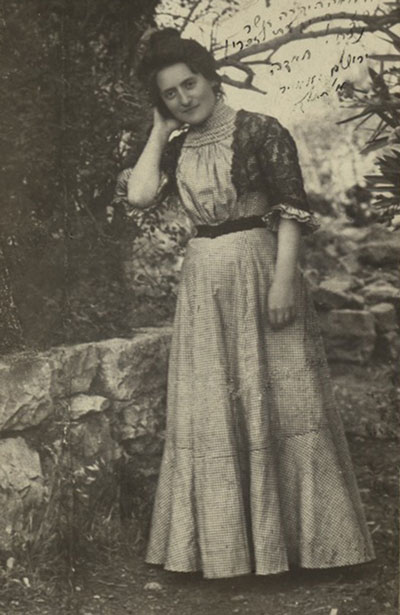
Hemda, second wife of Eliezer Ben Yehuda
Alone and unique from all the visionaries of the Jewish national renaissance, Ben Yehuda saw the whole picture: the need for a people wedded to its land speaking its own language.
Jewish nationalism, to Ben Yehuda, was both the return to the historical homeland and the revival of the Hebrew language. Ben Yehuda thus launched his great undertaking of creating The Complete Dictionary of Ancient and Modern Hebrew.
IRREPLACEABLE HEMDA
One last thought. The dictionary would never have been created had it not been for his second wife, Hemda, who married Eliezer six months after her sister Devora died. She labored with Eliezer every day through their 30 years of marriage. By the time he died, they had completed seven volumes of his dictionary. She had raised the money for all of them.
For the next three decades, 1922 to 1951, Hemda did everything in her power to complete the dictionary, along with her son Ehud. She raised the funds for another six volumes, averaging 600 pages each.
After the state of Israel came into existence, the completion of the dictionary became a state project. The last volume was published in 1958, seven years after her death. There were 17 volumes altogether.
A LEGACY LIKE NO OTHER
Today there is no special memorial for Ben Yehuda, not even a modest museum. However almost every town of any size has a Ben Yehuda street! Even so, the average Israeli knows surprisingly little about the life of Ben Yehuda.
Today Ben Yehuda’s original dictionary is out of print. If you are fortunate, you may be able to find one for sale on eBay. (I just did—although two volumes are missing.) But he has a legacy like no other. Every Israeli who opens his or her mouth to speak their native tongue today is a living memorial to Eliezer Ben Yehuda.
Ben Yehuda, then, was the prophet, the theoretician and tactician, the sign and symbol of the revival of the language. He himself wrote in 1908 in his newspaper, The Deer:
“For everything there is needed only one wise, clever and active man, with the initiative to devote all his energies to it, and the matter will progress, all obstacles in the way notwithstanding… In every new event, every step, even the smallest in the path of progress, it is necessary that there be one pioneer who will lead the way without leaving any possibility of turning back.”
Language and land created a physical foundation for the nation. Yet the greatest “impossibility” is still to come! It will happen when God’s Chosen People return to their God with all their hearts, souls and strength. They will not only be God’s beloved, but He will be their Beloved God. And I am sure they will worship Him and their Messiah in the beautiful Hebrew language!
To this writer, Ben Yehuda’s life is a magnificent example and inspiration to all born-again believers as to how God searches for even one person to stand in the gap to fulfill God’s vision, His desires and His purposes. Even now, God is looking for those to fulfill His plan for our generation.
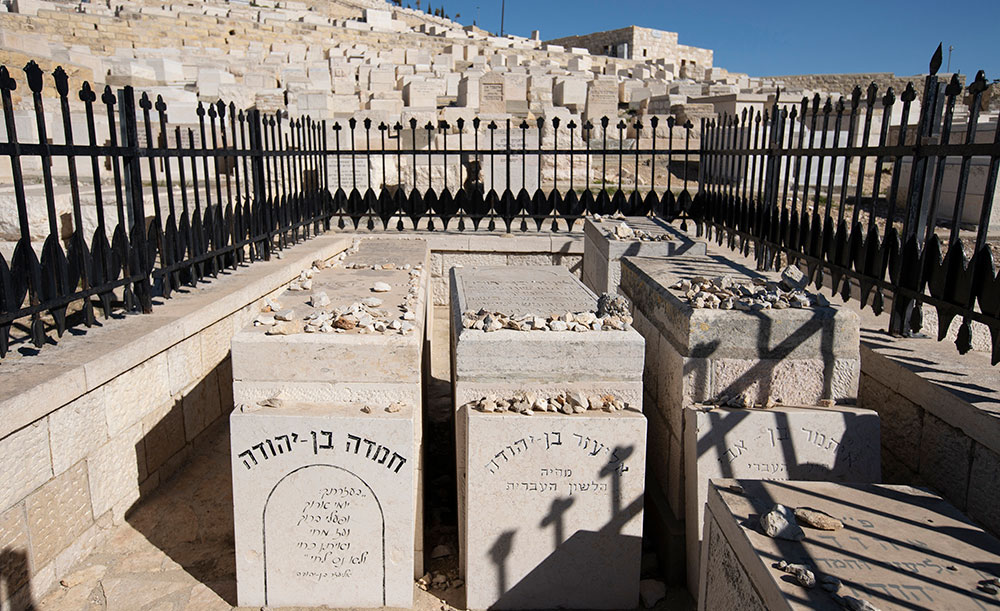
Tombs on the Mount of Olives are inscribed:
Eliezer Ben Yehuda (middle right) – Reviver of the Hebrew Language; Hemda Ben Yehuda (left) – With your help: my day is long, and my labor is blessed, and my mind is strong, and my strength is steady, and my natural vigor is not diminished (last line from Deuteronomy 34:70) [Taken from a tribute of Eliezer to his wife]
Other articles in the Ben Yehuda series:
Part 1: Father of the Modern Hebrew Language
Part 2: Eliezer Ben Yehuda: The Visionary
Part 3: The World’s Very First “Hebrew Child”
Part 4: Jerusalem’s Orthodox Jews vs. Eliezer Ben Yehuda
Part 5: Ben Yehuda’s New Virtuous Wife / Eliezer Ben Yehuda Meets Theodore Herzl
Part 6: Eliezer Ben Yehuda’s Destiny: Two Steps Forward, One Step Back
Part 7: The Secret to His Success